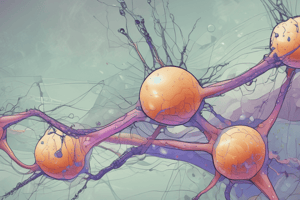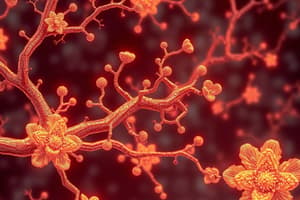Podcast
Questions and Answers
Which cranial nerve is affected in a male patient with decreased parotid salivary gland secretion?
Which cranial nerve is affected in a male patient with decreased parotid salivary gland secretion?
- IV
- VII (correct)
- III
- IX
Which option is true regarding the muscarinic receptors?
Which option is true regarding the muscarinic receptors?
- They function exclusively in the central nervous system.
- They are involved in the response of the heart. (correct)
- They are present only in skeletal muscle.
- They are present at the ganglia and motor end plate.
What role does the intracellular concentration of calcium play in myocardial contractility?
What role does the intracellular concentration of calcium play in myocardial contractility?
- It primarily lowers contractility. (correct)
- It has no effect on contractility.
- It mainly determines the strength of contraction. (correct)
- It affects only heart rate, not contractility.
What is the outcome in the extracellular fluid when there is excess calcium?
What is the outcome in the extracellular fluid when there is excess calcium?
Which characteristic increases due to myelination in nerve fibers?
Which characteristic increases due to myelination in nerve fibers?
Flashcards
Acetylcholine Receptors - location
Acetylcholine Receptors - location
Nicotinic receptors are at the ganglia and motor end plate; muscarinic receptors are at the heart.
Decreased Parotid Saliva - Nerve
Decreased Parotid Saliva - Nerve
The affected cranial nerve is VII (Facial).
Parasympathetic Pelvic Nerve Cut - Result
Parasympathetic Pelvic Nerve Cut - Result
Cutting the parasympathetic pelvic nerve results in erectile dysfunction and urinary/fecal retention.
Myocardial Contractility - Key Factor
Myocardial Contractility - Key Factor
Signup and view all the flashcards
High Extracellular Calcium - Heart Effect
High Extracellular Calcium - Heart Effect
Signup and view all the flashcards
Study Notes
Acetylcholine Receptors
- Nicotinic receptors are present at the motor end plate and ganglia.
- Muscarinic receptors are at the heart.
Cranial Nerve Affected
- A male patient with decreased parotid salivary gland secretion has a damaged cranial nerve IX.
Parasympathetic Pelvic Nerve
- Cutting the parasympathetic pelvic nerve during surgery causes failure of erection.
Myocardial Contractility
- Myocardial contractility depends primarily on intracellular calcium concentration in the sarcoplasmic reticulum.
Excess Calcium in Extracellular Fluid
- Excess calcium in the extracellular fluid can cause the heart to stop in diastole.
Absolute Refractory Period in Ventricles
- The absolute refractory period in the ventricles is the period when the ventricles are not excitable.
- It occurs before ventricular contraction.
- This period prevents tetanus of the heart.
Heart Rate Decrease
- The heart rate decreases in response to increased intracranial pressure.
Nerve Fiber Myelination
- Myelination increases the conduction velocity of nerve impulses.
Studying That Suits You
Use AI to generate personalized quizzes and flashcards to suit your learning preferences.
Description
Explore the intricacies of acetylcholine receptors, cranial nerve functions, and the effects of electrical signals on the heart in this quiz. Understand the roles of nicotinic and muscarinic receptors, as well as the physiological impacts of neural damage on cardiac performance. Test your knowledge of physiological mechanisms that govern heart rate and contractility.




